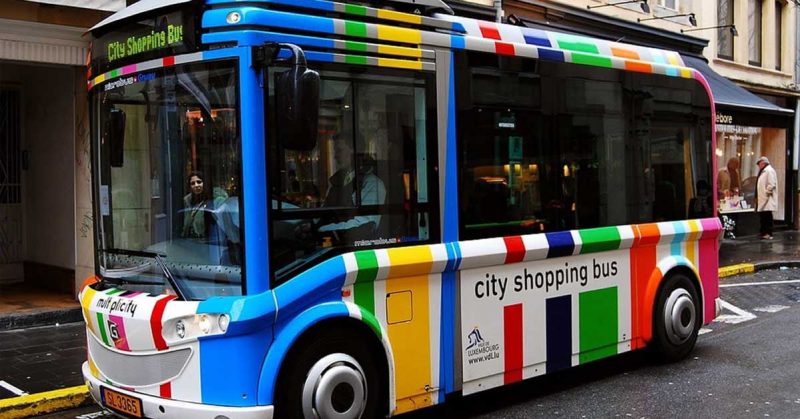Whispers started in 2018 and many people thought it was just the reelected Coalition government bragging over policies they weren’t planning to implement.
However, as of March 1, 2020, all modes of public transportation in Luxembourg – trains, buses, and trams – are now completely free of charge throughout the entire country. [1] According to the Ministry of Mobility and Public Works, this move was made in the hopes that people would move away from driving to reduce the dense traffic congestion in such a small country.
Luxembourg is a small landlocked country in Western Europe surrounded by Germany, France, and Belgium. With a population of roughly 625,000 people in a 2,586sq.km area (roughly the size of Rhode Island), the capital city is intensely congested as workers from neighboring countries are attracted by the booming economy.
Luxemburg is one of the wealthiest countries in Europe and a solid attraction for job seekers. With the highest GDP per capita in the EU, they pay extremely high salaries and it’s no surprise that almost 200,000 workers (half of the workforce) come from neighboring countries. However, the price of housing has remained exorbitant and many of the workers have no choice but to come into the city straight from their own countries – Belgium, France, and Germany.
Is it really free… totally?
A 2016 survey recorded 662 cars on the road per 1000 persons in Luxembourg, the highest count in the entire European Union. [2] Luxembourg drivers that year spent an average of 33 hours stuck in traffic. Once the day starts, nearly every worker would pull into the major roads at the same time and leave the city tight and unmoving in the morning. The same could be said for evening rush hours. The move to discourage people from driving might bring a significant change. They aim to have at least 20% of all road drivers using public transport over the next five years, and to hopefully alert citizens and visitors of the country’s environmental problems.
“The country at this very moment is in really good shape. We, the government, want the people to benefit from the good economy.” says Dany Frank, a spokesperson for the Ministry of Mobility and Public Works.
However, questions arose as to how the government would make up for the €41m (£35m; $44m) lost in ticket fares. [3] Most likely, a chunk or all of the loss would be incorporated into taxpayers’ responsibility. “Of course, just because I call it free transport doesn’t mean nobody pays,” said Mr. Bausch, a member of Luxembourg’s green party, déi Gréng.
However, transportation was never costly across the country. A day’s double fare cost €2 and workers who went for the annual passes would usually have them largely subsided. Also, for road drivers, petrol and diesel are very cheap, so generally, nobody really spends a lot of their earnings on transportation. The entire project would cost the government over €500m, so a €41m loss in ticket fares would seem insignificant at this point.
Expected changes
According to Geoffrey Caruso, a professor at the University of Luxembourg and the Luxembourg Institute of Socio-Economic Research, removing the transportation fares may inadvertently deter people from enjoying their daily walks. Walking is important for overall well being, but the allure of free public transportation is harder to resist than a lot of people imagine.
“Rather than walking 500 meters, you see a bus coming and you say, ‘I (can) get on and travel 500 meters because it’s free,’” he says.
However, on the other hand, the new scheme might trigger the necessary changes needed in the cultural mindset that driving is the primary mode of transportation.
“(The government) might say, ‘It’s important that you ditch your car, and look, we made public transport free’ — and maybe this is helpful given the immense cultural shift we need.“
Luxembourg’s scheme is still in its budding stages, massively interrupted by the coronavirus lockdown, but all things considered, the country should start reaping significant benefits soon enough. The northern French city of Dunkirk (population: 200,000) also introduced free transportation for all its citizens in 2018. By 2020, they are hailing an unexpected increase in the number of bus commuters around the city, so much that the Parisian government almost employed the same measure. However, the idea was only floated around because it was deemed too expensive. Also, the capital city of Estonia, Tallin, introduced the same policy in 2013 but only for residents.
References
- “Luxembourg is the first country to make all public transport free.” The Guardian. Agence France-Presse. Retrieved November 4, 2020.
- “Passenger cars in the EU.” Europa. Retrieved November 4, 2020.
- “Free transport in Luxembourg, but what’s the cost?” BBC. Paul Kirby. Retrieved November 4, 2020.
- “GDP per capita, consumption per capita and price level indices.” Europa. Retrieved November 4, 2020.

